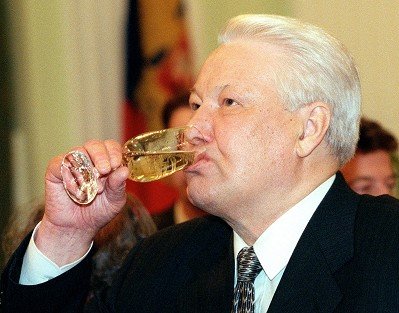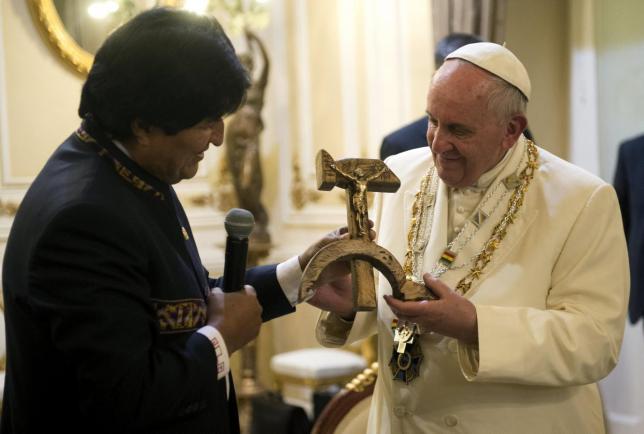Posted on October
11, 2015
Compassion Play
Pope Francis vs. Boris Yeltsin
by
Daniel
Clark
In 1989, Boris Yeltsin visited a Houston-area
supermarket, and was amazed by the variety of meats, cheeses, fruits and vegetables
that were available to the general public in the United States. According to biographer Leon Aron, the future
Russian president sat with his head in his hands after that experience, before
finally remarking, “What have they done to our poor people? … I think we have
committed a crime against our people by making their standard of living so
incomparably lower than that of the Americans.”
 Yeltsin,
who died in 2007, was not the stuff of which heroes are generally made. He was thoroughly corrupt, and he never did
grasp the concept of a free market. As
president, he tried to implement privatization by way of a redistributionist
voucher system, which burdened his country with a crushing national debt. Nevertheless, his compassion for the poor led
him to identify the primary cause of their suffering, and to try to alleviate
it.
Yeltsin,
who died in 2007, was not the stuff of which heroes are generally made. He was thoroughly corrupt, and he never did
grasp the concept of a free market. As
president, he tried to implement privatization by way of a redistributionist
voucher system, which burdened his country with a crushing national debt. Nevertheless, his compassion for the poor led
him to identify the primary cause of their suffering, and to try to alleviate
it.
Pope Francis, by comparison, defines his papacy by his
concern for the poor, but never does he hold tyrants accountable for creating
so much of the world’s poverty. Yeltsin,
though infirmed or inebriated through much of his public life, still retained
enough capacity for moral clarity to recognize Mikhail Gorbachev for the
scoundrel he is. Sometimes Francis seems
as if he couldn’t recognize evil if it walked up and handed him a crucifix in
the shape of a Soviet hammer and sickle.
Bolivian president Evo
Morales – a Communist, and an acolyte of the late Venezuelan goon Hugo Chavez –
did just that. The pope says he wasn’t
offended by it. Nor was he offended by
Morales himself, an enemy of freedom and a class-warmongering racist, whose
main governing principle is hatred. When
given a chance to address this evil, Francis only agreed with Morales about the
sins of white colonialists, and hysterically blamed the “unfettered pursuit of
money” for the world’s ills, as Morales stood by with an image of Che Guevara on his jacket.
Last year, when Francis visited the Korean peninsula,
he condemned the supposedly immoral economic system of South Korea. He had little to say about North Korea, other
than to tell the South that it needed to get along with the tyrants who rule
that belligerent, Communist prison-state.
The way he lectured, you’d think it was South Korea that had been the
aggressor in the war, and was constantly threatening to invade its neighbor to
this day.
The pontiff displayed the same kind of implausible
obtuseness when he went to Cuba.
Regardless of whatever he said to Fidel and Raul Castro in private
(which was almost assuredly horrid), he did not challenge them in public. Rather, he addressed the Cuban people,
telling them that they have the ability to change, as if he thought they were a
free people being governed by their own consent. Giving that impression was exactly the sort
of public relations coup that the Castros must have
been hoping for.
 When
Francis is surrounded by impoverished victims of a Communist dictatorship, does
he really convince himself that their circumstance has been created by the
wealthier peoples of the world? Does he
not see that every Communist government impoverishes its people by design? Does he not understand the moral value of
freedom, even if he chooses to ignore its positive economic impact?
When
Francis is surrounded by impoverished victims of a Communist dictatorship, does
he really convince himself that their circumstance has been created by the
wealthier peoples of the world? Does he
not see that every Communist government impoverishes its people by design? Does he not understand the moral value of
freedom, even if he chooses to ignore its positive economic impact?
If this makes it sound like the pope is actually
opposed to prosperity, that’s only because he is. In a 2013 exhortation, he wrote, “The culture
of prosperity deadens us; we are thrilled if the market offers us something new
to purchase. In the meantime all those
lives stunted for lack of opportunity seem a mere spectacle.” That the introduction of new products to the
market creates economic opportunities doesn’t interest him. Mind you, when he sees people whose lives
have been genuinely stunted by a government-imposed lack of opportunity, he’s
unmoved.
If only we could exhume the drunken, corrupt,
philosophically confused Russki, and have him become
pope instead. Rather than acting as the Castros’ minister of propaganda, he’d have probably called
them out in front of the world for their crimes, by pointing a finger at them
and demanding, “What have you done to your poor people!”
That would not have won him the praise of the
international media, but it might have made it more difficult for a pair of
Communist tyrants to sustain the systematic impoverishment of their
people. Pope Francis, apparently, would
not consider that a fair trade-off.
The Shinbone: The
Frontier of the Free Press